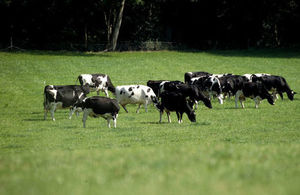TB strategy ahead of schedule as England set to apply for officially TB-free status for half the country
Government's strategy to tackle bovine TB continues to deliver results

Cattle
England is set to apply for Officially TB-Free (OTF) status for more than half of the country next year - two years ahead of schedule - as the Government’s strategy to tackle bovine TB (bTB) continues to deliver results.
Dealing with Bovine TB in England costs taxpayers over £100 million a year, required the culling of 28,000 cattle in 2015 and causes devastation and distress for rural communities.
Gaining OTF status for the low risk area, covering the north and east of England, would boost trade opportunities and mean some herds require less regular TB testing, reducing costs for farmers.
This would be the first time anywhere in England has enjoyed this status, making beef exports from the UK more attractive for trade partners around the world. Achieving this status for the low risk area is a key step in the government’s 25-year plan for the whole of the UK to be TB-free by 2038.
Environment Secretary Andrea Leadsom said:
Gaining global recognition that more than half of England is TB-free will be a significant milestone in our long-term plan to eradicate this devastating disease, and will open up new trading opportunities for farmers.
We have much still to do in the worst affected parts of the country, but this shows that our strategy - combining practical biosecurity measures, a robust cattle movement and testing regime, and badger control in areas where the disease is rife - is right and is working.
Results published today confirm all ten licensed badger control operations achieved successful outcomes. A consultation opens today on next steps for badger control in areas that have completed the first four years of intensive culling. This will mean the disease reduction benefits we anticipate are prolonged for many years to come.
Other measures announced today as part of the government’s 25-year strategy to eradicate bovine TB are:
-
Wider use of blood tests alongside the current skin test in the high risk area to provide a more sensitive testing regime in TB affected herds, minimising the risk of leaving infected animals in herds.
-
A plan to introduce new, more coherent powers to manage the TB risk in pigs, sheep, goats, deer and camelids, to bring them more in line with cattle controls. This will include new statutory compensation arrangements for these species.
-
More frequent updates to the ibTB online tool which allows farmers to view TB outbreaks close to their farm. From early in 2017 the data will be refreshed every fortnight rather than every month.
Chief Veterinary Officer Nigel Gibbens said:
This year we have seen that badger control can be delivered successfully on a wider scale. Further expansion in the coming years, alongside our robust cattle movement and testing regime, will allow us to achieve and maintain long term reductions in the level of TB across the South West and Midlands where the disease is currently widespread.
The government is taking robust action to beat the disease, with a strategy including stronger cattle testing and movement controls, good biosecurity, badger control in areas where TB is rife and vaccination when possible. The strategy sets out how we plan to achieve TB-freedom across the country by 2038.
Vaccinating healthy badgers is part of the government’s long-term plan and could play an important role in preventing bovine TB spreading to new areas of the country. Defra plans to resume the Badger Edge Vaccination Scheme, which offers support for private badger vaccination projects in edge area counties, in 2018 when we expect vaccine supplies to be available once more following the current global shortage.
The government is also supporting farmers to take practical action to reduce the risk of infection onto their farm. This includes support for a new CHeCS TB cattle herd accreditation scheme, on-farm biosecurity demonstrations for farmers, and training for vets delivered by APHA jointly with the private sector. Farmers can also access practical guidance on the TB Hub, which brings advice from farming experts, vets and government together in one place.
Background
-
Summary of responses to a consultation on bovine TB: controlling bovine TB in non-bovine animals
-
For more information, please contact the Defra press office on 020 8026 3663 and 020 8225 7618.